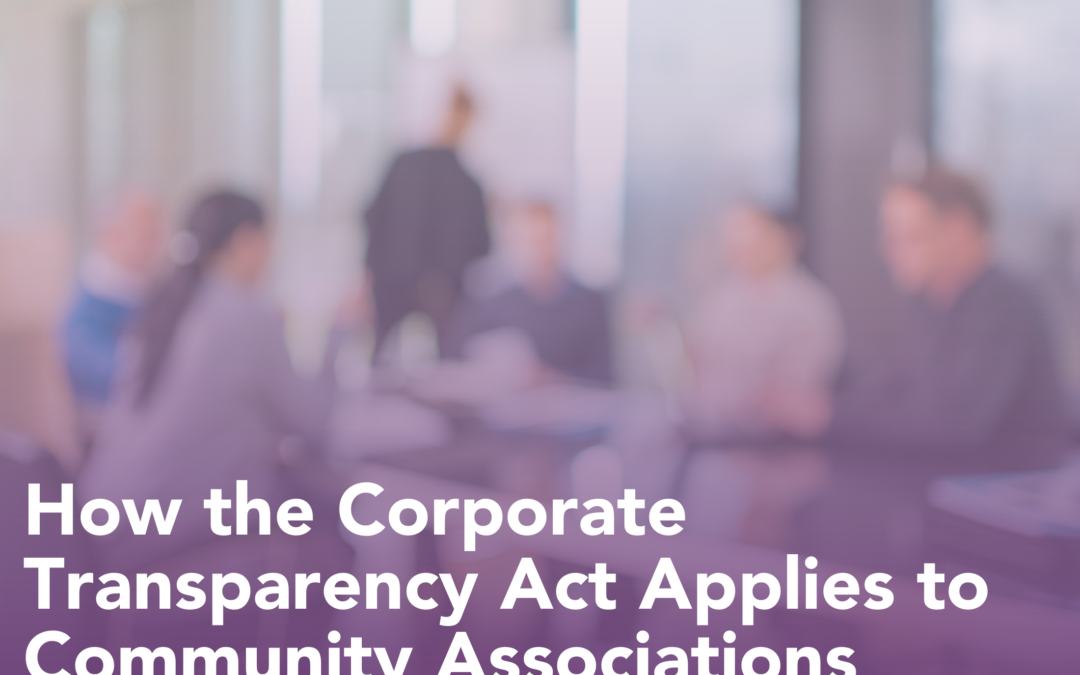In 2021, Congress passed the Corporate Transparency Act. Before you stop reading, this law likely applies to your community association and/or the communities you work with every day. This blog post is a bit technical, but please, read on!
The intent of the Corporate Transparency Act is to help detect and report suspicious activity related to money laundering and terrorist finance, to facilitate tracking money that has been sourced through criminal or terrorist activity, and to safeguard national security and the U.S. financial system.
This law applies to corporations; including local non-profit corporations that have less than $5 million in assets, fewer than 20 employees, and don’t otherwise meet broad exemptions like banks, credit unions, investment companies, venture capital, securities exchange or clearing agency, insurance companies, public utilities, accounting firms, tax-exempt organizations as qualified and determined with status by the IRS, i.e. 501c4 organizations, large operating companies, and inactive entities.
The consensus by community association lawyers is that community associations incorporated at the state level will be impacted by this new law and will have a responsibility to file information with FINCEN through the Beneficial Ownership Information (BOI) reporting requirements. The Beneficial Ownership Information (BOI) reporting program is slated to be implemented with filings beginning January 1, 2024. It is important to note the filing deadline for existing corporations is January 2025. The filing is not yet open.
At a minimum, here is what a community association will need to report to the FINCEN federal agency on an annual basis. It is expected the filing will be electronic.
- Business name
- Legal name of board members, birthdate, home address, an identifying number from a driver’s license, state ID, or passport
- Identity of the individual with substantial control: The same information (name, birthdate, home address, identifying number) of person (s) who exercise substantial control over financial reporting for the community association corporation. It is currently unclear whether a community manager and/or management company qualifies as an individual with substantial control. This is yet to be confirmed. CAI will continue to evaluate this and provide guidance accordingly.
- Changes, corrections, and additions to the filing must occur within 30 days of when you become aware of the change (i.e., board member moves, is replaced, etc.).
Of great concern is that noncompliance of filing could result in civil penalties of $500 per day and criminal penalties of up to $10,000, as well as up to 24 months in prison.
CAI doesn’t believe the Corporate Transparency Act is intended to apply to community associations. Accordingly, we’re taking the following measures:
- Request community associations be exempt from the Act and the subsequent Beneficial Ownership Information (BOI) reporting requirements.
- Request delay of the implementation of the Beneficial Ownership Information (BOI) reporting requirements by supporting H.R. 4035/S. 2623 and H.R. 5119.
- Urge confidentiality of the individual corporate filings of the Beneficial Ownership Information (BOI) reporting through rulemaking process.
We need your help to urge members of Congress to support exempting community associations, delaying implementation, and limiting access to corporate filings. Click here to take action today!
Resources:




I sign this petition in hopes of removing Common Interest Communities from this filing requirement.
I believe any bill that will hold boards accountable is a good thing. Will this stop what is happening in our association, where the property management is in full control of our finances, charging seller and buyers outrageous transfer fees in trust for our association, and keeping the money, using our tax exempt status to avoid paying taxes? Maybe not, but it’s a start. I am hoping this never happens again to any association. If filing is a little inconvenient, that’s too bad. It’s protecting the members that are going to ultimately be held responsible for the taxes. Something has been needed to be done. We’re told our power is our vote and your corporation continues to protect these criminals as they cheat us out of our elections and continue to take funds that ultimately the members are going to be held accountable for. I’m for the accountability of this bill.
Hi Sonya, curious….doesn’t your Governing Documents state what transfer fees are and wondering how a property management company can make any adjustments to that? I am a HOA manager and there is no legal way to do anything other than what the Governing Documents state. Unless, of course they are charging the HOA for their services and it is misconstrued as transfer fees?
sign this petition in hopes of removing Common Interest Communities from this filing requirement.
My only concern with this new legislation is that we already have members who do not want to divulge their private information to a 3rd party for a simple background check. This, albeit, meant for a very good purpose, will hinder efforts to obtain dedicated board members. This is already a problem.
This cannot be intended for incorporated HOA’s. Most are regulated by the covenants filed with secretaries of state and most states add another layer of regulation in their state laws and consolidated statutes. FINCEN lives and breathes in the banks, so unless your HOA only accepts cash and stashes it under a mattress, it is both an admission of FINCEN’s failure and just another duplication of bureaucracy.
As a 20-some year volunteer member of ‘my’ HOA, MK above is spot-on, board members are hard to attract, but now you have to submit personal information to the government to volunteer!